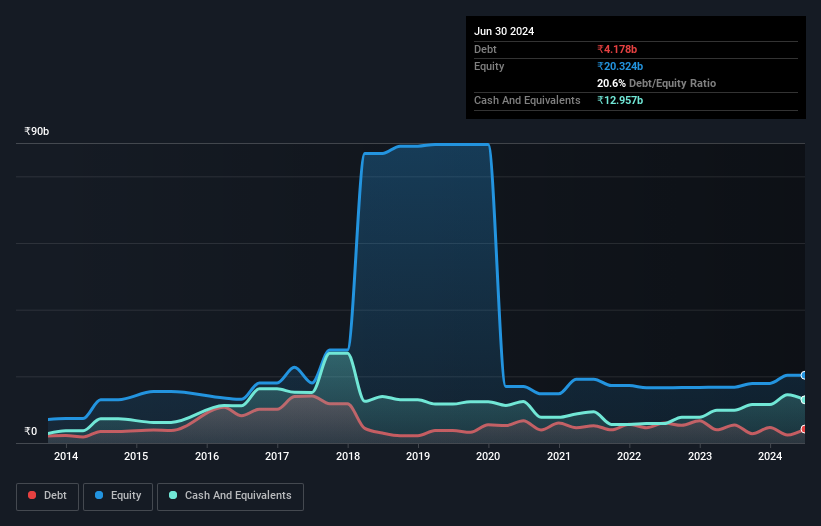- India
- /
- Hospitality
- /
- NSEI:THOMASCOOK
Here's Why Thomas Cook (India) (NSE:THOMASCOOK) Can Manage Its Debt Responsibly

David Iben put it well when he said, 'Volatility is not a risk we care about. What we care about is avoiding the permanent loss of capital.' So it might be obvious that you need to consider debt, when you think about how risky any given stock is, because too much debt can sink a company. We can see that Thomas Cook (India) Limited (NSE:THOMASCOOK) does use debt in its business. But is this debt a concern to shareholders?
Why Does Debt Bring Risk?
Debt is a tool to help businesses grow, but if a business is incapable of paying off its lenders, then it exists at their mercy. Ultimately, if the company can't fulfill its legal obligations to repay debt, shareholders could walk away with nothing. However, a more frequent (but still costly) occurrence is where a company must issue shares at bargain-basement prices, permanently diluting shareholders, just to shore up its balance sheet. By replacing dilution, though, debt can be an extremely good tool for businesses that need capital to invest in growth at high rates of return. The first thing to do when considering how much debt a business uses is to look at its cash and debt together.
See our latest analysis for Thomas Cook (India)
How Much Debt Does Thomas Cook (India) Carry?
You can click the graphic below for the historical numbers, but it shows that Thomas Cook (India) had ₹4.18b of debt in March 2024, down from ₹5.43b, one year before. However, it does have ₹13.0b in cash offsetting this, leading to net cash of ₹8.78b.

How Healthy Is Thomas Cook (India)'s Balance Sheet?
According to the last reported balance sheet, Thomas Cook (India) had liabilities of ₹33.8b due within 12 months, and liabilities of ₹10.0b due beyond 12 months. On the other hand, it had cash of ₹13.0b and ₹7.05b worth of receivables due within a year. So its liabilities total ₹23.8b more than the combination of its cash and short-term receivables.
This deficit isn't so bad because Thomas Cook (India) is worth ₹96.6b, and thus could probably raise enough capital to shore up its balance sheet, if the need arose. But it's clear that we should definitely closely examine whether it can manage its debt without dilution. While it does have liabilities worth noting, Thomas Cook (India) also has more cash than debt, so we're pretty confident it can manage its debt safely.
Importantly, Thomas Cook (India) grew its EBIT by 67% over the last twelve months, and that growth will make it easier to handle its debt. When analysing debt levels, the balance sheet is the obvious place to start. But it is future earnings, more than anything, that will determine Thomas Cook (India)'s ability to maintain a healthy balance sheet going forward. So if you're focused on the future you can check out this free report showing analyst profit forecasts.
Finally, a business needs free cash flow to pay off debt; accounting profits just don't cut it. While Thomas Cook (India) has net cash on its balance sheet, it's still worth taking a look at its ability to convert earnings before interest and tax (EBIT) to free cash flow, to help us understand how quickly it is building (or eroding) that cash balance. Over the last two years, Thomas Cook (India) actually produced more free cash flow than EBIT. That sort of strong cash conversion gets us as excited as the crowd when the beat drops at a Daft Punk concert.
Summing Up
Although Thomas Cook (India)'s balance sheet isn't particularly strong, due to the total liabilities, it is clearly positive to see that it has net cash of ₹8.78b. The cherry on top was that in converted 286% of that EBIT to free cash flow, bringing in ₹7.2b. So is Thomas Cook (India)'s debt a risk? It doesn't seem so to us. The balance sheet is clearly the area to focus on when you are analysing debt. However, not all investment risk resides within the balance sheet - far from it. For example, we've discovered 1 warning sign for Thomas Cook (India) that you should be aware of before investing here.
If you're interested in investing in businesses that can grow profits without the burden of debt, then check out this free list of growing businesses that have net cash on the balance sheet.
Valuation is complex, but we're here to simplify it.
Discover if Thomas Cook (India) might be undervalued or overvalued with our detailed analysis, featuring fair value estimates, potential risks, dividends, insider trades, and its financial condition.
Access Free AnalysisHave feedback on this article? Concerned about the content? Get in touch with us directly. Alternatively, email editorial-team (at) simplywallst.com.
This article by Simply Wall St is general in nature. We provide commentary based on historical data and analyst forecasts only using an unbiased methodology and our articles are not intended to be financial advice. It does not constitute a recommendation to buy or sell any stock, and does not take account of your objectives, or your financial situation. We aim to bring you long-term focused analysis driven by fundamental data. Note that our analysis may not factor in the latest price-sensitive company announcements or qualitative material. Simply Wall St has no position in any stocks mentioned.
About NSEI:THOMASCOOK
Thomas Cook (India)
Offers integrated travel services in India and internationally.
Undervalued with reasonable growth potential.
Similar Companies
Market Insights
Community Narratives



